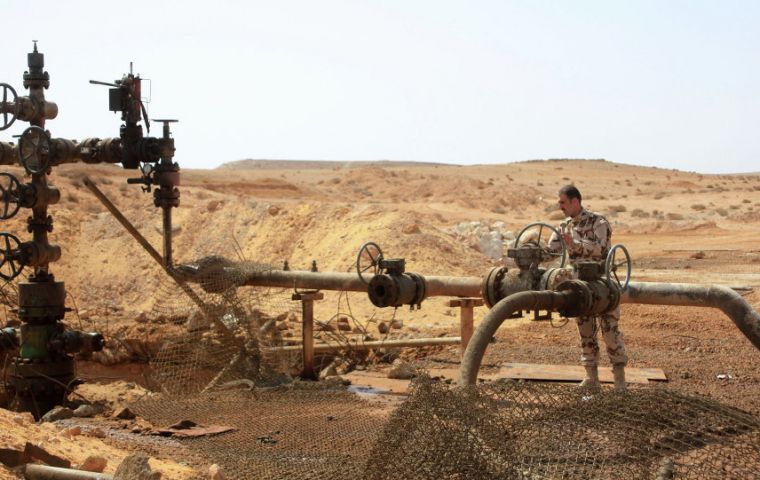MercoPress. South Atlantic News Agency
Oil Market Fears: War, Default And Nuclear Weapons
 Verisk Maplecroft surveyed a long list of countries, and produced its Government Stability Index (GSI), which uses some predictive data and analysts forecasts to take stock of geopolitical risk in var
Verisk Maplecroft surveyed a long list of countries, and produced its Government Stability Index (GSI), which uses some predictive data and analysts forecasts to take stock of geopolitical risk in var The U.S. is one of the few areas of the world in which there is an energy investment boom underway, a development that could smooth out the uncertainties of geopolitical events around the world. At the same time, outside of the U.S., there is a deterioration of stability in many oil-producing regions, aggravating risks for both oil companies and the oil market, according to a new report.
Financial risk firm Verisk Maplecroft explores these two trends as they play out simultaneously. The U.S. shale sector has emerged from years of low oil prices, damaged but still intact. Importantly, the shale industry “can ride out price dips and respond quickly to upticks, weakening OPEC in the process,” James Lockhart-Smith, director of financial sector risk at Verisk Maplecroft, wrote in the report. Combined with deregulation at the federal level, the oil industry is in the midst of an investment boom in the U.S.
Meanwhile, things are not so rosy elsewhere. Verisk Maplecroft surveyed a long list of countries, and produced its Government Stability Index (GSI), which uses some predictive data and analysts forecasts to take stock of geopolitical risk in various countries over the next few years.
The results are not encouraging. The number of countries expected to see a deterioration of stability “significantly outnumber those we see becoming more stable,” the firm said. The reasons are multiple, including low oil prices, but also the erosion of democratic institutions.
“We don't see increasing instability necessarily ending in coups or significant political upheaval, but a less predictable above-ground-risk environment is likely to emerge,” Verisk Maplecroft’s Lockhart-Smith said. “Arbitrary decision making, possible measures to buy off key stakeholders or an inability to pass regulatory reforms will be the main risks to projects in these countries, as their governments seek to stabilize and maintain their influence.”
Not all of the countries expected to suffer from a decline in stability are that important for the oil market, such as Romania or Kenya. Also, some countries might be on an improving path, but at the same time present a downside risk that, while unlikely, could be huge.
In this case, Iraq stands out. Verisk Maplecroft says that Iraq “has a business-friendly upstream environment” and the forecast is for stability to improve. However, even if it seems somewhat reasonable that things could trend in the right direction, the downside risk is massive. And there are is no shortage of potential catalysts: The report points to elections in May, plus the “deep ethno-sectarian divisions and weak institutions.”
Venezuela is another obvious flashpoint. The deterioration of the country’s economy and oil sector have been profound. But Venezuela also illustrates a different problem – that disruption need not come from a coup, a civil war or some other obvious geopolitical development. Verisk Maplecroft points to the purge of state-owned PDVSA following the unsuccessful coup in 2002 as a poignant example. The country’s oil production has steadily eroded over the past decade and a half since the Venezuelan state sacked experienced professionals at PDVSA and used revenues for other purposes while failing to invest in existing oil assets.
Verisk Maplecroft argues that Egypt is a potential contemporary example of that phenomenon. The increasingly authoritarian government in Cairo could roll back the policies that attracted investment from oil and gas companies in the first place over fears of a popular uprising.
Finally, one of the more intriguing cases is that of Russia, the largest oil producer in the world. Verisk Maplecroft sees little risk of political upheaval as Russian President Vladimir Putin seeks another six-year term in March, but a battle could ensue in the upcoming years over his succession when his term is up in 2024, and “factional struggles between liberals and statist former security officials are already ramping up in anticipation of his exit,” the report says.
Verisk Maplecroft puts the odds of a general deterioration of political stability in Russia through 2021 at 90 percent, and the “oil sector will be a strategic prize in this battle, not least because Rosneft CEO Igor Sechin is a central protagonist.”
In the near-term, there are two huge geopolitical threats to the oil market, but neither seem all that likely. Verisk Maplecroft says a potential war on the Korean Peninsula or a war between Iran and Saudi Arabia are the largest threats to the oil market, but both situations, while tense, will probably stop short of outright military conflict. Still, the mere threat of conflict, could add to the risk premium for crude oil prices.
By Nick Cunningham of Oilprice.com




Top Comments
Disclaimer & comment rules-

Read all commentsWhy “fear”? War, Default & Weapons give an excellent opportunity to the producers to hike the Oil-Prices way up
Mar 06th, 2018 - 11:20 pm 0Commenting for this story is now closed.
If you have a Facebook account, become a fan and comment on our Facebook Page!